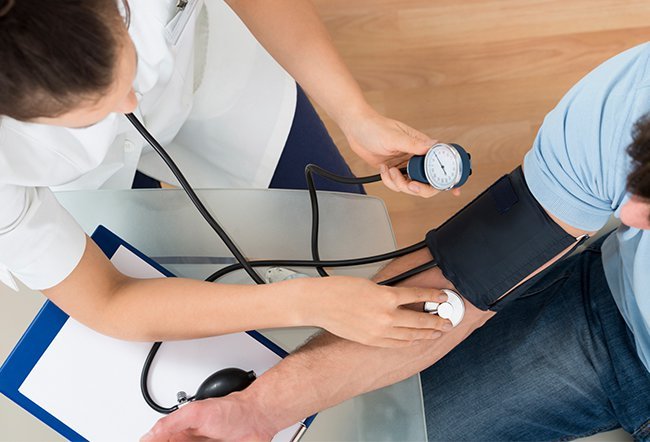Is 110 Over 70 a Good Blood Pressure?

Blood pressure is defined as the pressure exerted by a blood column against the walls of the arteries. It is often described in two values. The upper value is the systolic pressure and the lower value is the diastolic blood pressure.
Blood pressure of 110/70 mmHg is normal in an adult. According to the latest American Heart Association guidelines, all people with blood pressure greater than 130/80 mmHg have hypertension and need treatment. Thus, the systolic blood pressure of 110 to 130 mmHg is acceptable and 60 to 70 diastolic blood pressure is acceptable. Anything lower is low blood pressure.
Hypertension, sometimes referred to as high blood pressure (high BP), is a medical disorder in which the blood pressure in the arteries remains consistently high. It is a leading cause of death in developing countries.
Cardiovascular illness, stroke, heart attack, heart failure, aneurysm, atrial fibrillation, peripheral arterial disease, vision loss, chronic renal disease, and dementia are all risks associated with hypertension.
What are the causes of hypertension?
Hypertension is divided into two categories, each with its own set of causes.
- Hypertension (primary or essential)
- There is no known cause of hypertension in most people. Primary or essential hypertension is a type of hypertension that develops gradually over time.
- Multiple variables can cause primary hypertension, including:
- Hypertension secondary to primary hypertension
- An underlying health problem can induce hypertension in some people.
- Secondary hypertension is a type of high blood pressure that appears suddenly. Measured blood pressure is greater in secondary hypertension than in initial hypertension.
- Secondary hypertension is caused by a variety of conditions and their consequences, including:
- Kidney disease
- Congenital heart defects
- Congenital blood vessel defects
- Obstructive sleep apnea
- Endocrine tumors
- Adrenal gland tumors
- Cushing syndrome
- Congenital adrenal hyperplasia
- Thyroid problems
- Use of illegal substances such as cocaine and amphetamines
- Pregnancy
- Obesity
- Certain medications, such as birth control pills, cold remedies, decongestants, pain relievers, and some prescription pharmaceuticals
13 risk factors of hypertension
Hypertension is caused by several factors, including:
- Age older than 60 years (With age, plaque forms and causes the arteries to harden and constrict)
- Being overweight or obese
- Regular tobacco use
- Alcohol abuse
- Male gender
- Sedentary lifestyle
- Lack of exercise
- High-fat diet
- High salt intake in the diet
- Low potassium intake diet
- Stress
- Family history of hypertension
- Existing health conditions, such as cardiovascular disease, diabetes, chronic kidney disease, sleep apnea, and high cholesterol levels
What are the symptoms of hypertension?
Hypertension is often referred to as a "silent killer," because most people with it have no symptoms. It may take many years for symptoms to appear when the problem has progressed to a severe level.
Nonetheless, symptoms of hypertension may include:
- Nosebleeds
- Anxiety
- Sweating
- Fatigue or confusion
- Irregular heartbeat
- Facial flushing
- Dizziness
- Vision problems
- Chest pain
- Shortness of breath
- Sleeping issues
- Blood in the urine
- Blood spots in the eyes
- Chest, neck, or ear pounding
What are the complications of hypertension?
Hypertension damages blood arteries and organs by putting too much pressure on artery walls.
Uncontrolled high blood pressure can lead to a variety of complications, including:
- Heart attack or stroke: High blood pressure can cause the arteries to stiffen and thicken, resulting in a heart attack or stroke.
- Heart failure: Due to the high pressure in the blood vessels, the heart needs to work harder to pump blood. The walls of the heart's pumping chamber swell because of this (left ventricular hypertrophy), which can lead to heart failure.
- Aneurysm: An abnormal bulge in a blood vessel that can cause death if it bursts.
- Kidney failure: Kidneys with weakened and restricted blood arteries are unable to operate normally.
- Blindness: Hypertensive retinopathies in the eye can cause vision loss.
- Metabolic syndrome: Metabolic syndrome is a collection of metabolic illnesses. Diabetes, heart disease, and stroke are more likely to occur as a result of these disorders.
- Memory or comprehension problems: Uncontrolled hypertension impairs a person's capacity to think, recall and acquire or comprehend new concepts.
- Dementia: Blood flow to the brain is restricted by narrowed or clogged arteries, resulting in dementia.
What is the treatment for hypertension?
Treatment for high blood pressure is aimed to keep blood pressure below 130/80 mmHg.
Treatment involves healthy lifestyle modifications (weight management, salt restriction, regular physical activity, dietary recommendations) and medications.
- The type of medication prescribed for high blood pressure is determined by the patient's blood pressure readings and overall health.
- Diuretics, angiotensin-converting enzyme inhibitors, angiotensin II receptor blockers, calcium channel blockers, beta-blockers, alpha-blockers, alpha-beta blockers, aldosterone antagonists, vasodilators, and central-acting medicines are some of the medications used to treat hypertension.
